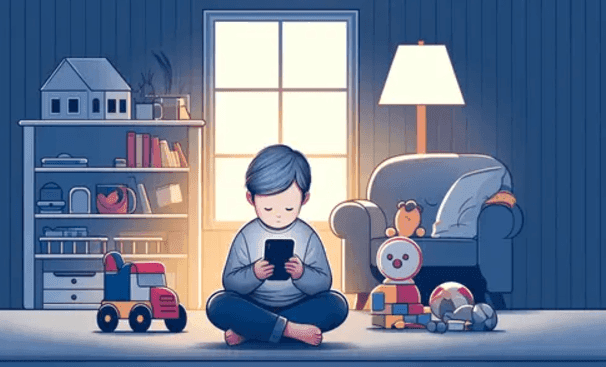What is Virtual Autism?
Virtual autism is sometimes difficult to assess, but it is important to narrow down. Knowing whether your child’s autistic symptoms are due to autism spectrum disorder, or virtual autism, is crucial to their developing brains, as well as to the mental health of the entire family.
Virtual autism refers to symptoms resembling autism spectrum disorder (ASD) that are triggered by excessive screen time, particularly in children under the age of three. Prolonged exposure to screens can cause delays in language development, attention span issues, hyperactivity, and social difficulties. Research indicates that children exposed to more than 3 hours of screen time daily show signs like language delays and shorter attention spans, which may resemble ASD symptoms.
How Does Early Screen Exposure Affect Brain Development?
Early and excessive screen time can impede a child's sensory, motor, and emotional development. Unlike real-world experiences, screens primarily offer visual and auditory stimuli, which limits a child's ability to engage with other sensory inputs, delaying cognitive and language skills. This can lead to issues such as speech delay and difficulties with social interactions.
Virtual Autism vs. Autism Spectrum Disorder
While virtual autism can mimic the symptoms of ASD, it is crucial to distinguish between the two, as virtual autism is caused by excessive screen exposure and can be reversed with the right intervention. Autism, on the other hand, is a lifelong condition.
Can Virtual Autism Be Reversed?
Yes, virtual autism can be improved or reversed with early intervention. Reducing screen time, increasing physical activities, and engaging in hands-on learning and social interactions are essential steps. Research shows that the brain has remarkable regenerative abilities, and with the right stimulation, children can overcome developmental delays caused by excessive screen exposure.
How Can Parents Address Virtual Autism?
Parents should limit screen time and focus on activities that promote physical movement, social interaction, and cognitive development. Some tips include:
- Create a daily schedule and limit screen use
- Engage in activities like yoga, puzzles, hiking, or board games
- Encourage outdoor play and socializing with peers
- Use rewards for adhering to screen time limits
Spending quality time with children, engaging in meaningful interactions, and fostering a healthy environment can significantly reduce the symptoms of virtual autism.
How Homeopathy can help in Virtual Autism
Homeopathy offers a holistic approach to address the symptoms of virtual autism, focusing on the underlying imbalances in a child's physical and emotional health. While virtual autism is primarily caused by excessive screen exposure, the symptoms, such as language delays, attention deficits, social withdrawal, and hyperactivity, can be mitigated through homeopathic treatment.
Here’s how homeopathy can support children with virtual autism by providing
- Personalized Treatment
Homeopathy treats each child as an individual, considering their unique physical, mental, and emotional symptoms. By carefully selecting remedies that suit the child’s overall health and personality, homeopathy aims to address the root causes of developmental delays and promote overall well-being. - Cognitive and Language Development
Homeopathy helps to gradually restore the child’s ability to engage with their environment, facilitating progress in areas like language, memory, and concentration. - Emotional Balance
Children with virtual autism often exhibit emotional imbalances such as irritability, anxiety, or social withdrawal. Homeopathy can help calm and stabilize these emotions by address ing mood swings, temper tantrums, and anxiety, enabling children to regulate their emotions more effectively. - Reduced Hyperactivity
Hyperactivity is a common symptom in children with virtual autism. Homeopathic remedies helps to reduce restlessness and impulsivity, allowing the child to focus better and engage in more balanced activities. - Sensory Processing and Social Interaction
Virtual autism can impair a child’s sensory processing, affecting their ability to interact with the world around them. Homeopathy helps to rebalance sensory integration, allowing children to process stimuli more effectively. - Restoring Healthy Sleep Patterns
Excessive screen time can disrupt sleep patterns in children, further exacerbating their symptoms. Homeopathic remedies promote restful sleep, helping children recover from the overstimulation caused by excessive screen exposure.
In Conclusion: Virtual autism is not the result of bad parenting, but overexposure to screens can have detrimental effects. Parents should take proactive steps to reduce screen time and focus on hands-on learning and socialization. With the right interventions, children can recover from virtual autism and thrive in their development.
Homeopathy offers a gentle and individualized treatment approach for children with virtual autism, focusing on restoring balance to the body and mind. By addressing cognitive delays, emotional imbalances, hyperactivity, and sensory processing difficulties, we at Pinaakin clinic provides best homoeopathic treatment for virtual Autism that can help children recover from the effects of excessive screen time, promoting healthier development and social engagement.

